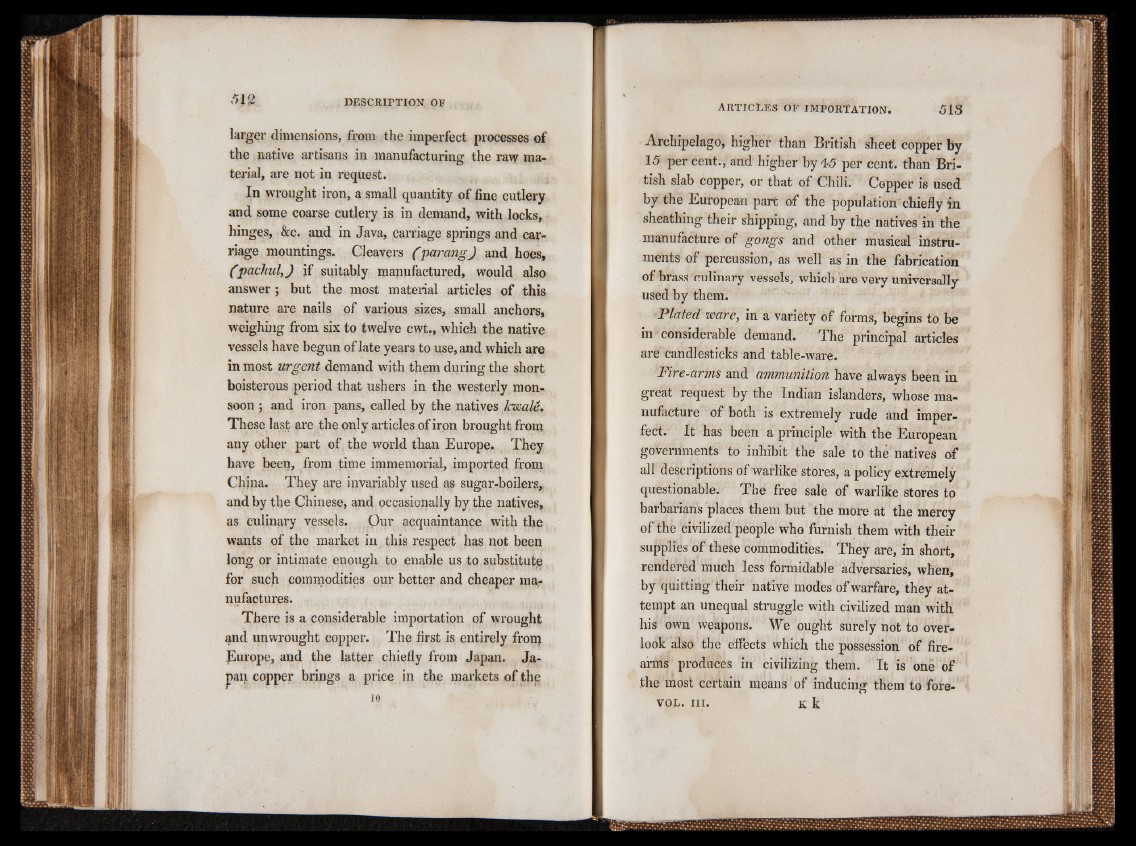
larger dimensions, from the imperfect processes of
the native artisans in manufacturing the raw material,
are not in request.
In wrought iron, a small quantity of fine cutlery
and some coarse cutlery is in demand, with locks,
hinges, &c. and in Java, carriage springs and carriage
mountings. Cleavers (parang) and hoes,
(pachul,) if suitably manufactured, would also
answer; but the most material articles of this
nature are nails of various sizes, small anchors,
weighing from six to twelve cwt., which the native
vessels have begun of late years to use, and which are
in most urgent demand with them during the short
boisterous period that ushers in the westerly monsoon
j and iron pans, called by the natives kwale.
These last are the only articles of iron brought from
any other part of the world than Europe. They
have been, from time immemorial, imported from
China. They are invariably used as sugar-boilers,
and by the Chinese, and occasionally by the natives,
as culinary vessels. Our acquaintance with the
wants of the market in this respect has not been
long or intimate enough to enable us to substitute
for such commodities our better and cheaper manufactures.
There is a considerable importation of wrought
and unwrought copper. The first is entirely from
JSurope, and the latter chiefly from Japan. Japan
copper brings a price in the markets of thp
10
Archipelago, higher than British sheet copper by
15 percent., and higher by 45 per cent, than British
slab copper, or that of Chili. Copper is used
by the European part of the population chiefly in
sheathing their shipping, and by the natives in the
manufacture of gongs and other musical instruments
of percussion, as well as in the fabrication
of brass culinary vessels, which are very universally
used by them. ; ’ i ■
Plated ware, in a variety of forms, begins to be
in considerable demand. The principal articles
are candlesticks and table-ware.
Fire-arms and ammunition have always been in
great request by the Indian islanders, whose manufacture
of both is extremely rude and imperfect.
It has been a principle with the European
governments to inhibit the sale to the natives of
all descriptions of warlike stores, a policy extremely
questionable. The free sale of warlike stores to
barbarians places them but the more at the mercy
of the civilized people who furnish them with their
supplies of these commodities. They are, in short,
rendered much less formidable adversaries, when,
by quitting their native modes of warfare, they attempt
an unequal struggle with civilized man with
his own Weapons. We ought surely not to overlook
also the effects which the possession of firearms
produces in civilizing them. It is one of
the most certain means of inducing them to fore-
VOL. III. k k